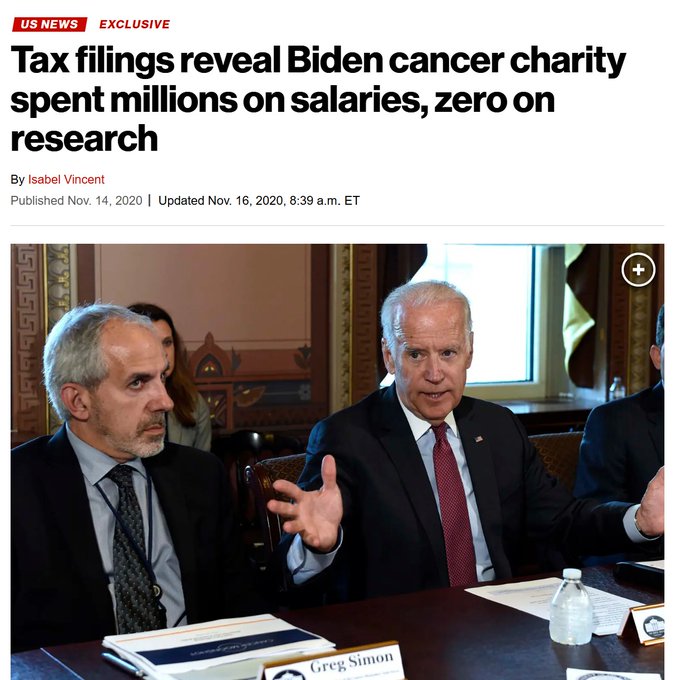You are using an out of date browser. It may not display this or other websites correctly.
You should upgrade or use an alternative browser.
You should upgrade or use an alternative browser.
Biden Administration Corruption
- Thread starter GURPS
- Start date
Well, that's karma for ya... if the research had been funded, a cure might have been found for his cancer.
Didn't he also say he was going to cure cancer?Well, that's karma for ya... if the research had been funded, a cure might have been found for his cancer.
I would enjoy watching the faces of Fauchi, Schiff for brains, crazy liz and others as their pardons are over turned and they face charges
Sarah Brenner, the No. 2 at the FDA, refused the COVID vax
By Benjamin RusheSara Brenner, worked as a career employee at the FDA until she was recently promoted to the No. 2 position under the new FDA Commissioner. Marty Makary. Brenner has recently stated that she never took the COVID vaccine despite it being a requirement for federal employees.
Brenner’s reasoning was that she was pregnant and concerned about the safety of the vaccine for both her and her child. Perhaps she arrived at that conclusion because she’s an expert on nanobiotechnology (although the picture she provided at the link is a curious choice), and therefore had serious and fully legitimate clinical reservations.
The question is why, as an FDA expert and Hippocratic oath-taking physician, she never spoke up earlier to warn other pregnant women about her concerns? This is an especially pointed question because, at the same time, members of the military were resigning or getting fired; and physicians, pharmacists and nurses were resigning or being fired plus being pursued by boards, losing their certifications, licenses, livelihoods, and being mocked by the press and doxxed all over social media.

Image created using AI.
While millions around the country who didn’t yield to the White House/CDC/FDA narrative were being banned from restaurants and other public venues, Dr. Brenner wrote zero articles, gave zero interviews, and spoke to zero congressmen and reporters. She kept her head down, keeping her specialized knowledge about mRNA lipid nanoparticles toxicity to herself, even as she kept her four-year-long “work at home” FDA job while thousands of pregnant women around the country got COVID vaccines to keep their jobs and (they thought) protect themselves and their babies.
Here is the reasoning Brenner offered to justify her decision to skip the vaccine. Maybe you can understand what it means, because I sure couldn’t, even after nearly a dozen readings:
“We’re moving very quickly to make it such that there will be more transparency, more available data and information, so that people ... can see and evaluate for themselves sort of what the truths are and what’s known and unknown,” she said. “And I'll go ahead and put it that way, because one of the biggest misses, I think, in the previous several years is that there was no acknowledgement of what was unknown, right? There was there were only statements and assertions that were really more like beliefs or things that were desired to be true than they were true knowns.” (Ellipses in original.)
Jill Biden’s role propping up Joe throughout his presidency can’t be ignored as questions over his cancer diagnosis swirl
As the anatomy of the great Joe Biden cover-up emerges, one dark figure stands menacingly taller than the rest.
That would be Vogue cover girl Dr. Jill Biden, who is starting to look more like Dr. Evil — a cartoonishly terrible, power-hungry and reckless movie villain — every day.
This week, as Jake Tapper and Alex Thompson’s devastating book “Original Sin” detailing the Dems’ elaborate cover-up of the 46th president’s infirmity as he ran — or, ahem, as he was run — for a second shot at the White House, Biden dropped a bombshell prostate cancer diagnosis.
The timing was undoubtedly meant to shift sympathy to the family and soften the atomic boom of the scandal.
The Walls Are Closing in on Biden’s Inner Circle
In a major development, Comer sent formal letters demanding transcribed interviews with five of Biden’s closest insiders. The list includes Dr. Kevin O’Connor himself, former Domestic Policy Council Director Neera Tanden, and longtime Biden loyalists Anthony Bernal, Annie Tomasini, and Ashley Williams. According to Comer, these individuals weren’t just witnesses; they were likely key players in the effort to hide Biden’s true condition while quietly allowing others to operate the levers of power on his behalf.
If the Biden team thought they could run out the clock, they have another thing coming. The investigation is gaining traction, and accountability may finally be catching up.
“The cover-up of President Biden’s obvious mental decline is a historic scandal. The American people deserve to know when this decline began, how far it progressed, and who was making critical decisions on his behalf,” Comer said in a statement released Thursday. “Key executive actions signed by autopen, such as sweeping pardons for the Biden Crime Family, must be examined considering President Biden’s diminished capacity. Today, we are calling on President Biden’s physician and former White House advisors to participate in transcribed interviews so we can begin to uncover the truth.”
Yeah the Biden Admin vetted these guys ..... they should be rounded up and deported
As the story is told, Jamal Wali, 36, was allegedly brought to the US in 2014 after working as an interpreter for the US forces in Afghanistan. He was pulled over for a routine violation in Fairfax, Virginia.
The obviously unstable Mr Wali shouted profanities at the police, professed his hatred for the United States and regret for not supporting the Taliban, and then eventually ended up opening fire on the police officers present. The shooting happened earlier this month, and the Virginia police released the bodycam footage earlier today.
There is something profoundly wrong with our immigration system when this level of instability is intentionally brought to the USA from a war zone in Afghanistan. The two police officers were wounded, Mr Wali was killed in the exchange.
[clip]
Unfortunately, these incidents follow an increasing trend as the cultural and sociological clash between foreign aliens and American values continues to unfold. Many people who travel to America come from places where tribalism, and tribal rules are the general way of life. As they encounter social rules and regulations that apply toward daily American life, they grow more and more frustrated over time.
There are a lot of people throughout the world who have no concept or reference point of EU, USA or even Western cultural civility. When I visited Russia last year this was often a topic of discussion about why the Russian Federation government controls immigration so severely.
As much as I did not like the sociology of Russia overall, there were some aspects to the strongly enforced rules protecting social cohesion that seemingly did make sense.
Virginia Police Release Bodycam Footage of Former Afghan Military Interpreter Opening Fire on Police
As the story is told, Jamal Wali, 36, was allegedly brought to the US in 2014 after working as an interpreter for the US forces in Afghanistan. He was pulled over for a routine violation in Fairfax, Virginia.
The obviously unstable Mr Wali shouted profanities at the police, professed his hatred for the United States and regret for not supporting the Taliban, and then eventually ended up opening fire on the police officers present. The shooting happened earlier this month, and the Virginia police released the bodycam footage earlier today.
There is something profoundly wrong with our immigration system when this level of instability is intentionally brought to the USA from a war zone in Afghanistan. The two police officers were wounded, Mr Wali was killed in the exchange.
[clip]
Unfortunately, these incidents follow an increasing trend as the cultural and sociological clash between foreign aliens and American values continues to unfold. Many people who travel to America come from places where tribalism, and tribal rules are the general way of life. As they encounter social rules and regulations that apply toward daily American life, they grow more and more frustrated over time.
There are a lot of people throughout the world who have no concept or reference point of EU, USA or even Western cultural civility. When I visited Russia last year this was often a topic of discussion about why the Russian Federation government controls immigration so severely.
As much as I did not like the sociology of Russia overall, there were some aspects to the strongly enforced rules protecting social cohesion that seemingly did make sense.

